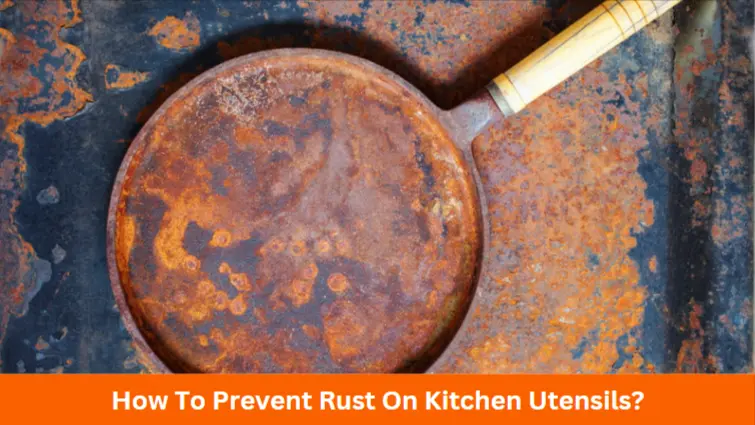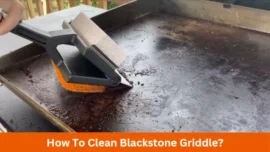Do you have a good set of kitchen utensils and are looking for how to prevent rust on kitchen utensils?
Then, you have landed at the right place!
You need to make only a few common changes in your daily kitchen work to prevent all the utensils from rusting. Let’s glance at what changes you can make to protect your kitchen utensils from getting rust.
Table of Contents
How to Prevent Rust On Kitchen Utensils?
Daily kitchen utensils generally come in contact with water, which can lead the utensils to get rusty. Thus, we have mentioned some prominent tips to prevent kitchen utensils from catching rust.
Tip – 1: Go For the Right Detergent
Firstly, you need to check out the detergent’s ingredients and ensure that it should not contain any harsh ingredients, including bleach. For a better alternative, you can also use mild soap to wash the stainless steel chemical free.
While choosing any soap or dishwashing soap, make sure that it does not contain chemicals such as bleach, alcohol, ammonia, or chloride. If your dish soap is a little strong, you can dilute it with water for less damage over utensils.
Tip – 2: Go For the Right Scrubber
Stainless steel needs to be cleaned with soft scrubs so it won’t damage the uppermost layer of the steel. Therefore, avoid using any hard scrubber like steel wool.
We would better recommend you use silicone scrubbers. They work better and clean deeply while providing great fragrance to the utensils. You can also try out the microfiber sponges.
Tip – 3: Clean the Appliances Properly
The British Stainless Steel Association has claimed that the stainless steel must be cleaned properly and have a proper supply of oxygen to avoid getting rust.
Crevice corrosion is one of the major reasons for rust formation. It forms a pit because of the left food or dirt on the utensils for a longer period, which forms rust. Therefore, clean your utensils properly to avoid rusting.
It would help if you did not wash your utensils with the steel wool scrubber, as its tiny parts may remain on the utensils and lock in the moisture there, which leads your utensils to form rust upon it.
Tip – 4: Soak All The Moisture From Utensils
After cleaning and washing the stainless steel items, wash and wipe them with a dry cloth. It will protect them from moisture and exposure to air, which is the main reason for rusting.
Therefore, wipe your wash utensils with a clean and soft cloth. Avoid using the dishrag to keep your appliances safe from food oils.
Tip – 5: Stainless Steel Cleaners
Using the Stainless Steel Cleaners is the best way to clean your stainless steel and give it a long and rust-free life. It forms a coating over the surface of the utensils and protects them from forming rusting. It also provides a shiny look to the utensils.
You can also coat your utensils with oil just like the metals to avoid the formation of rust over them. Therefore, keep your utensils rust protected in advance.
Final Words
These are the 5 tips on how to prevent rust on kitchen utensils. It will protect your utensils from rusting. We hope you like this guide and find the best tips to keep your utensils from rusting.
Frequently Asked Questions (FAQs)
-
How do you keep utensils from rusting?
There are 5 easy steps to keep utensils from rusting:
- Use a mild detergent or soap wash
- Use a soft, bristled scrubber
- Clean the utensils properly
- Get your utensils dry properly
- Use the stainless steel cleaners to provide a healthy coating to your utensils.
-
Why are all my utensils rusting?
Metals generally get rust when they come in contact with water and oxygen both. It happens because of a natural chemical reaction. Salty or acidic water can increase the speed of the corrosion process. Therefore, your kitchen utensils easily rust because of washing.
-
How do you keep stainless steel from rusting?
Let’s have a look at some of the methods to keep your stainless steel from rusting:
- Use the required tools only
- Use the polish lines to protect your stainless steel utensils
- Use cleaners that have alkaline; alkaline chlorinated, or non-chloride-containing properties
- Use salt-free and non-acidic water
- Your equipment must be cleaned
- Rinse the utensils properly to let any dirt or food particles remain.
-
What removes rust from kitchen utensils?
Follow these simple steps to remove rust from kitchen utensils completely:
- Pour the vinegar over the rust
- Make sure that every part of the rust is soaked in the vinegar
- Let it soak for around 5 minutes
- Now, clean the utensil with a scrubber, and you will see all the rust going away
- Lastly, wash it with cold water and dry it with a microfiber cloth.
-
What are the 3 ways to prevent rusting?
Let’s have a look at three ways to prevent rusting:
- Coat your utensils with a little oil to keep the rust away
- Painting the metal can also reduce the chances of rusting, at least until the paint is on
- Galvanizing also helps in keeping the rust away from metal
-
Does vinegar stop rusting?
White vinegar consists of acetic acid, which helps in dissolving the rust. You can pour the vinegar over the rusted areas or soak the entire item in the vinegar to clean the rust.
-
Should I throw away rusted utensils?
The utensils which consist of rust should either be treated or thrown away. Cooking food with rusted utensils will be dangerous and should be used. Throw away the rusted utensils before they harm you.
-
Is it OK to use rusty cookware?
The University of Illinois at Urbana-Champaign has stated that cooking food with a little rust is not health hazardous. You can drink a little bit of rusty water.
-
Does toothpaste remove rust?
Toothpaste effectively removes the rust’s stains but not the rust itself. All you have to do is to apply a small amount of toothpaste over the rust stains and rub it with a damp cloth. After that, rinse it normally.
Related Article:






